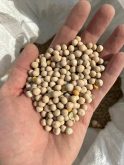Demand for fertilizer, driven by pressure to improve global food production, has more than doubled PotashCorp’s first-quarter bottom line.
The Saskatoon fertilizer producer posted net income of $566 million (all figures US$) on sales of $1.89 billion) in its Q1 ending March 31, compared to $198 million on $1.15 billion in the year-earlier period.
“It took nearly a decade to empty the global grain cupboard and we can’t refill it overnight,” CEO Bill Doyle said in a release Thursday. “The good news is that the world is more than capable of producing enough food, but improved farming and fertilization practices will be required.”
Read Also

Pulse Weekly: Tariffs guide yellow peas in 2025
Tariffs were a major influence on Canadian yellow pea prices in 2025, with levies imposed by China and India. The two countries are Canada’s biggest foreign pulse buyers.
The company’s potash, nitrogen and phosphate segments all contributed record gross margin in Q1, and income from its fertilizer investments in Jordan and Chile rose from $13 million to $23.4 million for the quarter.
“Continued rising world grain demand reduced the expected global
stocks-to-use ratio for wheat and coarse grains to a record low” during Q1, the company wrote.
“Low inventories of grains and oilseeds, a long-standing
problem, finally started to attract attention from the United Nations,
governments and the general public. Some Asian and Latin American countries
have now changed their export policies to ensure crops will be available for
their own domestic use. This has put further pressure on distribution of the
world’s grain supply.”
Supply constraints and costs of natural gas and other needed inputs have pushed fertilizer prices to record levels, the company said. Shipments to China were reduced as contracts for seaborne potash expired at the end of 2007, but rising demand in other markets “more than offset” that reduction, the company said.
Thus, the company said, North American potash producers’ inventories were drawn down 37 per cent below the previous five-year average at the end of Q1.
In its market outlook, PotashCorp noted the competition for global crops is giving rise to concern over food inflation, for which it said the most practical solution is to increase production, which in turn will require fertilizers to boost yields.
“While higher
crop prices are among the factors behind rising food costs, the impact is
minimal as farm costs make up less than 20 per cent of the end-cost of
processed food in the U.S.,” the company wrote. “Similarly, biofuels have been targeted as part of
grains. The primary driver of food inflation is the ever-increasing demand
created by hundreds of millions of consumers choosing more nutritious diets in
nations with growing populations and wealth.”














